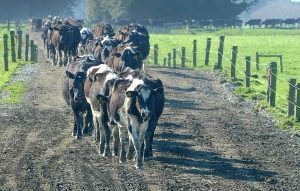
Washington state dairy workers can start earning overtime pay after a new law took effect July 25.
The law, signed by Gov. Jay Inslee in May, allows dairy farmers to earn overtime pay at 1.5 times their regular rate for any work above 40 hours per week.
Farm workers had previously been exempt from overtime pay because they were excluded from the federal Fair Labor Standards Act of 1938.
“This bill corrects a historic injustice,” said Sen. Karen Keiser (D-Des Moines). “Most workers in America can take the 40-hour work week for granted, but for decades, agricultural workers have not been eligible for overtime pay.”
The new state law will also extend the overtime requirement to all agriculture workers, who will be eligible for benefits beginning in 2022.
In 2022, non-dairy agricultural workers will receive overtime for any time worked over 55 hours. The hour threshold will decrease to 48 hours in 2023, and finally to 40 hours in 2024. Nationwide, California, Minnesota, Maryland and New York have previously mandated overtime pay for farm employees.
The bill passed both houses with bipartisan support, but not all are supportive of the bill. The Washington Farm Bureau, a voluntary advocacy organization that represents the interests of over 46,000 members, claimed the bill would be detrimental to the agricultural industry.
“We didn’t have much time to prepare,” said Leann Krainick, owner of Krainick Dairy and a board member for the King-Pierce Farm Bureau. “Our workers are extremely valuable. It’s hard to find a person that has the dedication, but from a business side, it was a shock to a lot of farms.”
Unlike the rest of the agricultural industry in the state, which has a phase-in period for overtime requirements, dairy farmers only had months to prepare for how they would pay additional labor costs. Dairy farmers cannot raise the price of their product to meet the demand, Krainick said, because milk is subsidized nationally by Federal Milk Marketing Orders.
“What we get for our milk is pretty much what all farmers on the West Coast get,” she said.
Krainick said increased labor costs may put Washington farms at a disadvantage nationally and incentivize farm owners to move to states like Idaho, where labor is cheaper. She said other farms may close all together.
“That’s a scary thought because agriculture is a huge part of our state’s economy and provides food security,” she said.
King County has an estimated 1,800 farms, most of which are small farms with few or any laborers. Krainick said large farms, with more workers, will feel the biggest effect of the new law, but the impacts on the industry will trickle down to smaller farms.
“We all work together and provide infrastructure for each other,” she said.
Behind the law
The creation of the new law came a year after the 2020 Martinez-Cuevas v. DeRuyter Brothers Dairy landmark state Supreme Court case in which the court ruled, 5-4, there were no reasonable grounds for dairy workers to be exempt from state overtime requirements.
As part of the lawsuit, Yakima dairy workers Jose Martinez-Cuevas and Patricia Aguilar, alleged to have worked between nine and 12 hours a day, six days a week. According to the state Senate bill, farm workers are some of the state’s poorest workers, with 30% of the nation’s farm workers living below the poverty line, almost double the rate of American families overall.
“It was a long journey, but through the lawsuit we were able to establish a right to overtime,” Martinez-Cuevas said following the case. “[Dairy workers] worked long hours, without overtime compensation, and put their health and safety at risk.”
In winning the suit, Martinez-Cuevas and Aguilar received $600,000 in retroactive overtime payments dating back to 2017, according to Columbia Legal Services.
Prior to providing overtime benefits to all agriculture workers, the new law was initially designed to prevent all other dairy workers in the state from seeking retroactive overtime pay, which Krainick said would have crippled the state’s dairy industry.
“It would have been absolutely devastating,” she said. “It’s not only a bookkeeping nightmare, but it would have cost us $2 million, and I don’t know where we would have gotten that money.”
Krainick said it would have benefited dairy farmers to have a phase in approach, allowing them time to figure out their new labor budget. However, she said because of the wording of the lawsuit, the state Legislature could not add a phase in approach for dairy farmers.

























